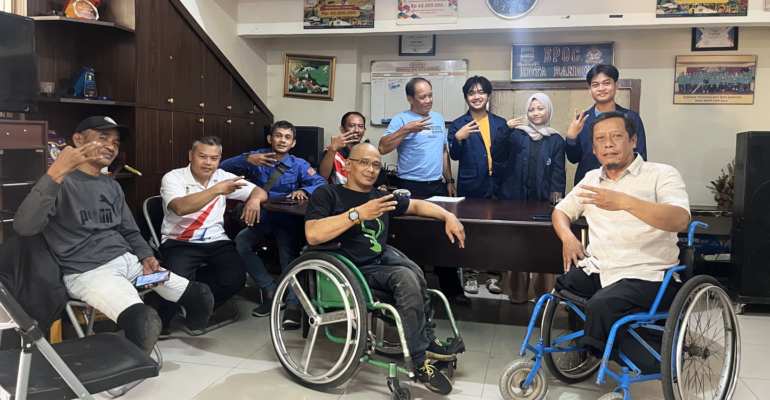IPB University Students Conduct a Survey About Economic Challenges of Persons with Disabilities

IPB University students successfully conducted a survey related to Extra Cost and Employment Opportunities for Persons with Disabilities to the Association of Indonesian Persons with Disabilities (PPDI) Bandung City. The survey took place on 25/6 and was conducted by a team incorporated into the Student Creativity Program for Social Humanities Research (PKM-RSH).
One of the team members, Sulthan, said that one of the main challenges faced by people with physical disabilities is the burden of extra costs that cover various aspects, ranging from medical needs, assistive devices, transportation, to education.
“People with physical disabilities require special aids such as wheelchairs and canes, then for people with disabilities, public transportation is often not fully accessible. They need to use special transportation which costs more,” Sulthan said.
In addition to the additional cost burden, people with disabilities also experience limited employment opportunities. PKM-RSH Easeability Team Leader, Yunia revealed that many companies still view disability as an obstacle rather than seeing their abilities and potential.
“Negative stereotypes and prejudices that people with disabilities are unable to work productively often lead to them not being accepted in the recruitment process. Although the Indonesian government has issued various policies to support people with disabilities, the implementation of these policies is often not maximized,” said Yunia.
Another member, Farid, also said that inaccurate data on the number and needs of people with disabilities resulted in the budget allocated for social assistance, subsidized assistive devices, and other programs often being insufficient or misdirected.
“Without proper data, many public facilities do not provide adequate accessibility, so people with disabilities have to pay extra to get the access they need,” said Farid.
Meanwhile, the Chairperson of PPDI Bandung City, Dzumono, said that the limitations of public transportation that are not disability-friendly are also a challenge, one solution is that usually people with disabilities use modified vehicles as a means of transportation.
“However, this solution poses additional challenges and issues, especially regarding costs. Modified vehicles cost a considerable amount of money to purchase, modify and maintain. For many people with disabilities, this cost can be a heavy financial burden,” he said.
Dzumono hopes that after the research conducted by the PKM RSH IPB University Team, there will be improvements from the government regarding accessibility, employment opportunities, and the rights of persons with disabilities. (IAAS/Aly)



